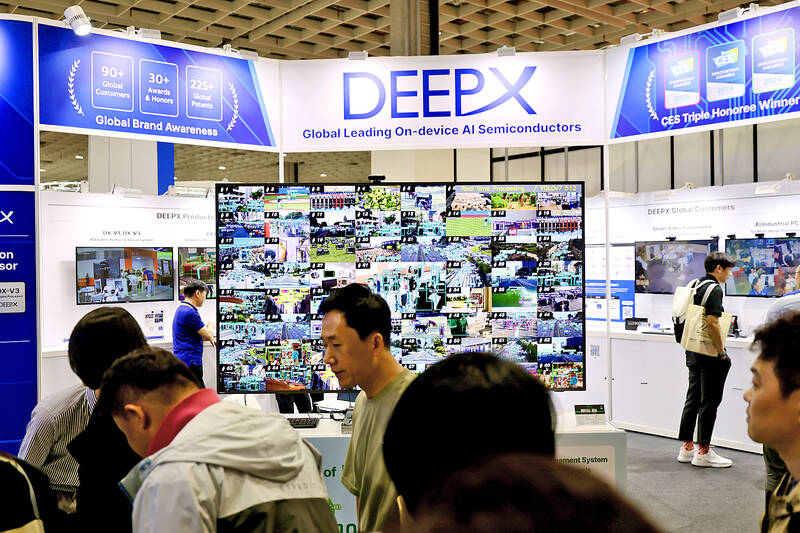Taiwanese firms last month showed more confidence about their six-month business outlook on expectations that demand for artificial intelligence (AI) applications would benefit more sectors, the Taiwan Institute of Economic Research (TIER, 台灣經濟研究院) said yesterday.
The sentiment gauge for local manufacturers printed 99.73, rising 1.07 points from a month earlier to a new 25-month high, as business is expected to flourish for chipmakers, thanks to the arrival of the high sales season for technology products, TIER economist Gordon Sun (孫明德) said.
Semiconductor firms are responsible for making chips used in AI, smartphones, high-performance computing and other applications.

Photo: Ritchie B. Tongo, EPA-EFE
High-end servers would prove another bright spot, Sun said, adding that he is less certain about replacement demand for AI personal computers.
The Taipei-based think tank said that 28.2 percent of local manufacturers are upbeat about their business prospects, while 16.7 percent forecast their business to weaken.
That expectation is because an economic recovery remains uneven as some manufacturers are still struggling with inventory adjustments and sharp competition from regional peers, Sun said.
The challenge is particularly evident for non-tech companies, which have to cope with terminations of favorable tax terms from China, which is axing the number of items that qualified under the Economic Cooperation Framework Agreement, the economist said.
That explained why 70 percent of chemical product suppliers hold flat views about business going forward, while steel makers have unfavorable views, he said.
“It will take longer for all sectors to share the benefit of economic recovery,” he said.
Machinery equipment and base metal product makers are also positive, as inventory adjustments have come to an end and they stand to benefit from public works projects and a renewed property market, Sun said.
The confidence measure for service providers climbed 1.69 points to 97.44, augmenting for three months in a row, the institute said.
Consumer spending remained healthy, but growth momentum slowed somewhat after two consecutive years of “revenge consumption,” Sun said, adding that securities and fund houses put up strong showings on the back of the TAIEX climbing to new highs.
The sentiment readings for construction companies and real-estate brokers rose 2.89 points to 110.05, as housing transactions heated up, aided by interest subsidies and an economic recovery.
TIER said it is not sure if the uptrend could sustain as the Executive Yuan is reviewing favorable lending terms for first-home purchases.
Many have blamed a resurgence of rising housing prices on the government-backed stimulus program. The central bank in the middle of this month tightened its reserve ratio by 25 basis points.

Intel Corp chief executive officer Lip-Bu Tan (陳立武) is expected to meet with Taiwanese suppliers next month in conjunction with the opening of the Computex Taipei trade show, supply chain sources said on Monday. The visit, the first for Tan to Taiwan since assuming his new post last month, would be aimed at enhancing Intel’s ties with suppliers in Taiwan as he attempts to help turn around the struggling US chipmaker, the sources said. Tan is to hold a banquet to celebrate Intel’s 40-year presence in Taiwan before Computex opens on May 20 and invite dozens of Taiwanese suppliers to exchange views

Application-specific integrated circuit designer Faraday Technology Corp (智原) yesterday said that although revenue this quarter would decline 30 percent from last quarter, it retained its full-year forecast of revenue growth of 100 percent. The company attributed the quarterly drop to a slowdown in customers’ production of chips using Faraday’s advanced packaging technology. The company is still confident about its revenue growth this year, given its strong “design-win” — or the projects it won to help customers design their chips, Faraday president Steve Wang (王國雍) told an online earnings conference. “The design-win this year is better than we expected. We believe we will win

Chizuko Kimura has become the first female sushi chef in the world to win a Michelin star, fulfilling a promise she made to her dying husband to continue his legacy. The 54-year-old Japanese chef regained the Michelin star her late husband, Shunei Kimura, won three years ago for their Sushi Shunei restaurant in Paris. For Shunei Kimura, the star was a dream come true. However, the joy was short-lived. He died from cancer just three months later in June 2022. He was 65. The following year, the restaurant in the heart of Montmartre lost its star rating. Chizuko Kimura insisted that the new star is still down

While China’s leaders use their economic and political might to fight US President Donald Trump’s trade war “to the end,” its army of social media soldiers are embarking on a more humorous campaign online. Trump’s tariff blitz has seen Washington and Beijing impose eye-watering duties on imports from the other, fanning a standoff between the economic superpowers that has sparked global recession fears and sent markets into a tailspin. Trump says his policy is a response to years of being “ripped off” by other countries and aims to bring manufacturing to the US, forcing companies to employ US workers. However, China’s online warriors